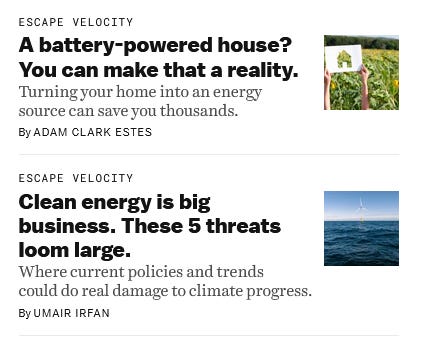A battery-powered house?
Can using a home as an energy source save you thousands?
You may wind up saving thousands of kWh rather than thousands of dollars…
So, an intriguing concept to reduce reliance on fossil fuels, sure, but the article doesn’t cover enough for those seeking ROI examples. Anyone can attempt this project on a small scale by obtaining solar panels from Harbor Freight Tools for example, and then adding a battery. It’s not as efficient as using whatever energy is generated directly from the solar panels.
In my case, 200 kWh to 300 kWh of monthly household usage so that’s fine for a small project that I could test on my own. The goal to DIY solar project success is to get the installed cost per watt to $1 so that there is a ROI. For folks with a shed or garage, this could work well enough to have an off-grid self-powered structure.
The Vox article examines home battery technology as a solution to power outages and energy costs. Home batteries like BioLite's Backup enable households to store solar energy, avoid food spoilage, and optimize electricity costs through time-of-use pricing. While upfront costs remain high, advancements in accessibility, smart-grid integration, and government subsidies are accelerating adoption.
Residential Battery Boom: U.S. residential battery capacity increased 54% (2023–2024), now powering ~1 million homes. Europe leads in adoption, but U.S. growth is attributed to worsening blackouts and climate anxiety.
Cost and Convenience: Products like BioLite's Backup ($2,000) offer 15–30 hours of fridge backup without professional installation. The Copper Charlie battery-powered induction stove avoids 240V outlets and enables cooking during outages.
Grid Resilience: Home batteries reduce peak demand spikes (e.g., evening energy rushes) by charging during off-peak hours. Bidirectional EV charging (e.g., GM's initiatives) further stabilizes grids.
Challenges: High upfront costs (e.g., $3,500–$6,000+ for systems) and uncertain U.S. policy support contrast with Europe/China's faster adoption. However, declining battery prices and smarter appliances (e.g., water heaters with storage) hint at broader electrification.
Net metering and solar integration allow users to sell excess energy but the Vox article doesn’t take the reader anywhere conclusive about households earning a profit from selling excess kWh at below market rates to utility companies. In most cases, my opinion is that residential solar projects do not have sufficient square footage to earn a profit, rather it helps partially offset the total fees and usage billed by the utlitiy company for delivering energy.








